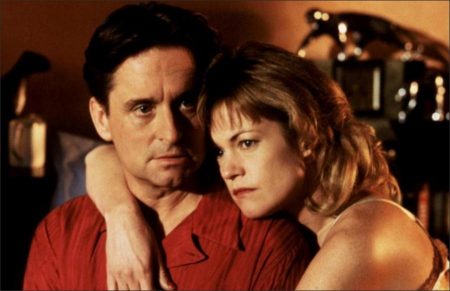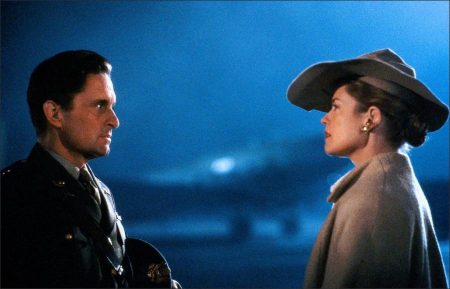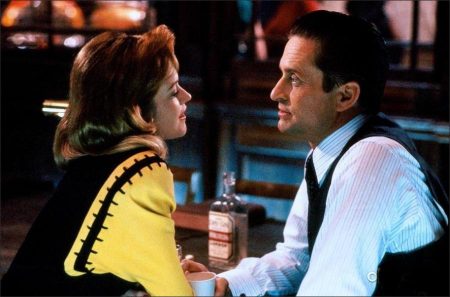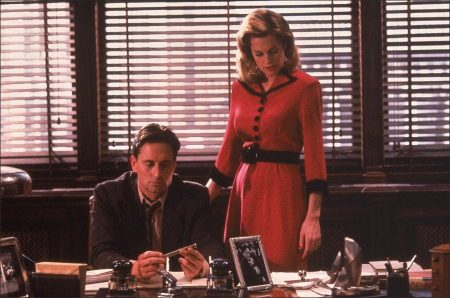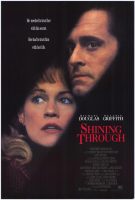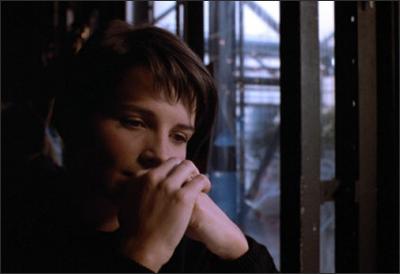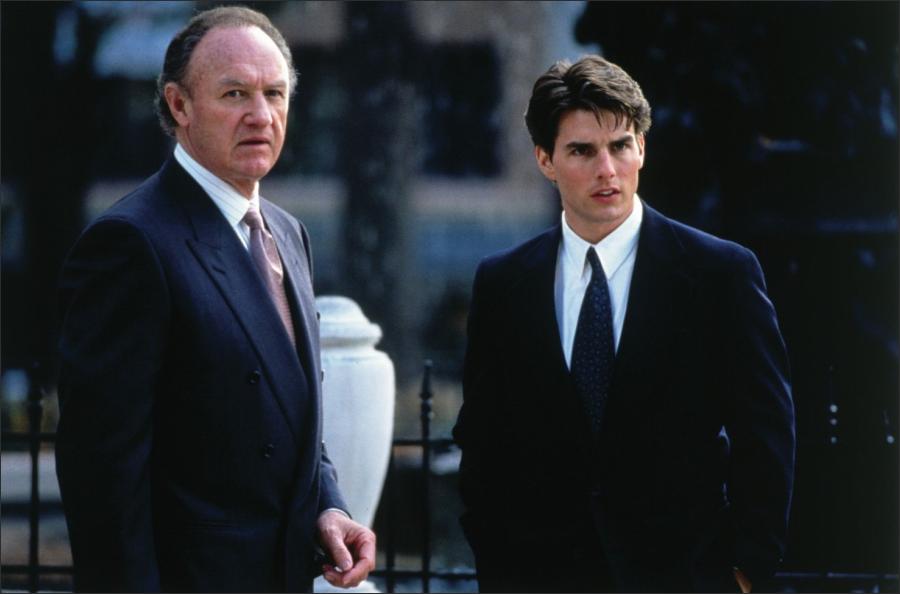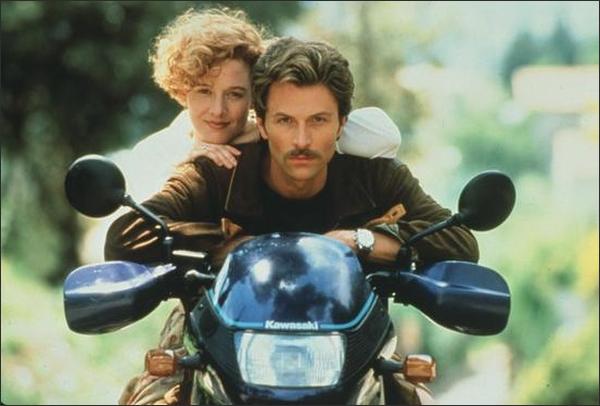Taglines: He needed to trust her with his secret. She had to trust him with her life.
Shining Through movie storyline. 1940, Linda Voss is a woman of Irish, Jewish-German parentage who loves the movies, especially films about war and spies. She gets a job at a New York law firm, after it’s revealed she can speak German, fluently. As secretary and translator to Ed Leland, she begins to suspect that her boss is involved in espionage work. The two become lovers, and when America officially joins the Allies in fighting Hitler, Linda volunteers to go undercover behind enemy lines.
Shining Through is an American World War II drama film which was released to United States cinemas on January 31, 1992, written and directed by David Seltzer and starring Michael Douglas and Melanie Griffith, with Liam Neeson, Joely Richardson and John Gielgud in supporting roles. It is based on the novel of the same name by Susan Isaacs. The original music score was composed by Michael Kamen. The film’s tagline is: “He needed to trust her with his secret. She had to trust him with her life.”
The production had intended to shoot in Budapest, but the fall of the Berlin Wall in 1989 made it possible to shoot the film on location in East Germany. The majority of the film was shot in Berlin and Potsdam starting in October 1990, just as Germany was being reunified. Studio work was done at the DEFA Studios, the state film studios of East Germany.
Because all of Berlin’s great train stations were destroyed in World War II, the production traveled some distance to Leipzig to shoot scenes in the Leipzig Hauptbahnhof terminus, built in 1915 and the largest in Europe. This was prior to its massive modernization by the Deutsche Bahn. The finale, set at a border crossing and involving a period train, was shot in Klagenfurt, Austria.
The New York City and Washington scenes at the beginning of the film were shot in and around London and at nearby Pinewood Studios. Locations included the Old Royal Naval College in Greenwich, Hammersmith, and St Pancras Station, which doubled for Zurich Station for a brief sequence set in Switzerland.
Film Review for Shining THrough
I know it’s only a movie, and so perhaps I should be willing to suspend my disbelief, but “Shining Through” is such an insult to the intelligence that I wasn’t able to do that. Here is a film in which scene after scene is so implausible that the movie kept pushing me outside and making me ask how the key scenes could possibly be taken seriously. This is our old friend, the Idiot Plot, all the way (you know, where the movie would be over in 10 minutes if everyone in it weren’t an idiot).
Take that climactic scene, for example, in which Michael Douglas, dressed as a Nazi officer, with a bloody bandage around his neck, tries to carry the unconscious Melanie Griffith past a border checkpoint even though he speaks no German. How does he handle the guards’ questions? He’s got a plan. He’s been on many previous missions to Germany, and he always carries along a little card that says “Wounded war veteran. Unable to speak.” That, and the bandage on his neck, do the trick.
Uh-huh. At the border, he doesn’t even produce the card. He simply points to his neck. That’s after the border guard has asked him about nine questions in German. Here’s what the movie hopes doesn’t occur to us: If he doesn’t speak German, he doesn’t understand it either, and even if you can’t talk, you need to understand what’s being said to you in order to make the appropriate non-verbal responses. Far from carrying Griffith across the border, Douglas would have been lunchmeat within five minutes of his first trip behind enemy lines.
But never mind. There are larger problems with this movie, which is sort of a cross between “Working Girl” and “The Cassandra Crossing.” The film starts with Griffith as a bilingual Irish-Jewish secretary who gets a job as Douglas’ secretary. He seems to be a lawyer, but she figures out right away that he’s a spy. (What a clever girl: She notices that the letters he dictates are in code.) They fall in love, he is a rat with women, he goes off to spy, she works in the secretarial pool, he returns, she wants a chance to go into Berlin and rescue her father’s relatives, and so on.
The first half hour of the movie isn’t bad, especially when she stays a jump ahead of him because of her familiarity with war movies. But there is never any believable romantic chemistry between Griffith and Douglas (his body language toward her is that of a man who detects bad breath), and once she’s in Berlin, all plausibility breaks down.
Imagine this. She is infiltrated into the house of a top Nazi official, as a cook. She botches the meal, serving hot cucumber soup and raw poultry and spilling a dish in a Nazi’s lap. She is fired. But another top Nazi immediately offers her a job as the nanny for his children. I know people who couldn’t believe “The Hand that Rocks the Cradle” because the nanny wasn’t checked out first.
Would a Nazi let an unknown person have the run of his house? There’s lots of Nancy Drew stuff, as when Griffith discovers the secret room in the Nazi’s basement by noticing there are two windows on one side but only one on the other, and there’s a hilarious scene in which she flees, frightened, through the city streets in a red opera cloak and a flowing white dress, and of course we get the “friends” who turn out to be enemies (we can tell because their eyes harden), and the escape down the laundry chute, and the convenient plans for the entire Nazi rocket-bomb operation, which she microfilms. But enough.
The movie is told in flashbacks, for no good reason, with an elderly, agonizingly coy Griffith recalling her story for a BBC interviewer. This would have worked better if Griffith had found a way to age her speaking voice, which remains in her usual breathless, good-little-girl style. It is said that with the collapse of the Soviet Union, Hollywood will have to return to the Nazi era for their villains. If they don’t find some smarter Nazis, we’re in for a slow couple of years.
Shining Through (1992)
Directed by: David Seltzer
Starring: Michael Douglas, Melanie Griffith, Liam Neeson, Joely Richardson, John Gielgud, Francis Guinan, Victoria Shalet, Sylvia Syms, Hansi Jochmann
Screenplay by: David Seltzer
Production Design by: Anthony Pratt
Cinematography by: Jan de Bont
Film Editing by: Craig McKay
Costume Design by: Marit Allen
Set Decoration by: Peter Howitt
Art Direction by: Desmond Crowe, Kevin Phipps
Music by: Michael Kamen
MPAA Rating: R for a scene of sensuality.
Distributed by: 20th Century Fox
Release Date: January 31, 1992
Views: 359
